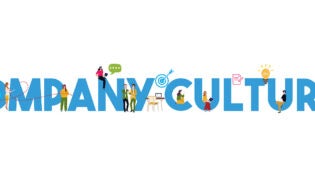Home > Leadership > Open Culture >
Do You Trust Your People Enough to Let Them Think?
By: Dave Brock

It’s odd, we interview people, anxious to hire the best and the brightest. Those people that have the proven track records, skills and experience to perform at the highest levels.
We assess people on their ability to think on their feet and respond quickly. In the interview process, we have questions designed to test their ability to think. We may engage them in scenarios and role plays to see how they handle themselves. We may leverage formal assessments, testing cognitive and other capabilities.
We find the right candidates—hopefully really smart people—onboard them, then put them in handcuffs (or whatever the functional equivalent is for “mind cuffs.”)
We force them to comply with endless rules, procedures, and processes. We script things down to the word, rehearsing people on their ability to regurgitate them, word for word, pause for pause. We monitor compliance for any variation.
If there are variations, we gently remind them about the rules and procedures. We tell them how much has been invested in tuning our messaging and positioning to be perfect, and encourage them to deliver them perfectly.
Some of this is well intended. We want to make it “easier” for our people to execute our strategies. We want to share our experience to help them be more successful: “Here’s the magic formula, just follow it and you will be successful.”
Sometimes it’s not well intended: “You will comply, or you will not work here!” I actually have a phone call last week with a sales person struggling with that very order.
But then things break down. We can’t anticipate every situation. We can’t script every conversation. Our people are left with the inability to respond because we haven’t given them the flexibility, tools, training, and coaching to respond.
Our people fall into traps themselves. They are so used to being provided the answers, the procedures, rules, scripts. But when faced with something that doesn’t fit, they don’t know how to deal with it.
Selling is tough! Selling is a “thinking person’s” occupation!
The highest performers are those that have the ability to figure things out. Who don’t need the rules, processes, or scripts to dictate every move or word, but take them as a starting point, and thoughtfully adapt them to the situation and customer—increasing their impact and effectiveness.
Freeing our people to think, to figure things out for themselves, to use their judgment—all within a framework or set of principle and values—is critical in driving effectiveness in today’s complex B2B worlds.
But there’s some risk—and I think that’s what holds many organizations back, perhaps unconsciously. The risk is that people will make mistakes. They will every once in a while make the wrong judgement, do the wrong thing. They may try something and fail.
Unless we have a culture, that genuinely accepts mistakes, that learns and grows from them, that recognizes there will be failures, we will never trust and empower our people to think. As a result, we will never unshackle them and let them perform at the highest levels possible.
So if we are to trust our people enough to let them think, we have to trust them enough to let them make and learn from mistakes.
This drive new and simpler behaviors. If we equip our people, through hiring the right people, training, and coaching them in problem solving, critical thinking, analysis and related skills, we provide a foundation. We can then simplify our businesses; we don’t have to be so prescriptive on everything they do, we don’t have to be bound by rules and procedures, because our people are grounded in the basic principles and values of the company, and we are holding them accountable for doing the right thing (yet supporting and coaching them when they make a mistake).
We, as individuals and organizations, become so much more effective, efficient, and impactful, when we are governed by principles, supported by the necessary processes and guidelines. We perform at much higher levels when we trust our people to think, trust our people to make mistakes, continually learning and growing from each.
Do you trust your people to think?
Do you trust your people to make mistakes and learn from them?
Do you trust yourself to think?
Do you trust yourself to make mistakes and learn from them?
This article was originally published by Partners in Excellence
Published: October 31, 2013
1588 Views
1588 Views














